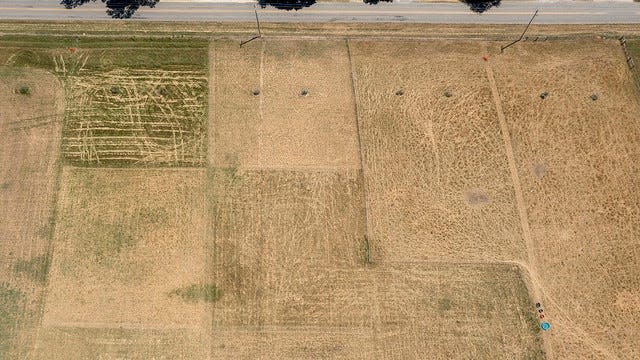Drought hitting farmers hard in Arkansas
North of Van Buren, in Crawford County, a cattle farmer has given up this summer on keeping his herd any longer. Inflation, fuel prices, and now a sudden drought are to blame.
Pastures are not aplenty with green grass this summer, and hay could be in short supply. Drought is having an impact.
"It's devastating to cattle farmers," said Sam Chandler, general manager of the Fort Smith Stockyards.
The U.S. Drought Monitor on Thursday reports Arkansas as in abnormally dry stage of drought with areas surrounding the River Valley in moderate drought. The sudden lack of rain in the past month is also being called a flash drought by meteorologists. Burn bans have been issued in Sebastian County and nearly the entire state.
Chandler planned to take three trailers to the farm north of Van Buren on Sunday to pick up the herd. It is not the only farm where the cows are being sold off too early, he said. Farmers are selling them off so they do not have to keep them through the winter, Chandler said.
Hot temperatures and no rain
Drought has a grip on Arkansas farmers. The River Valley has not had rain in over a month. Wildfire risk is high, and temperatures stay hot. It was the last thing farmers needed with the state of the economy as it is.
More: Firefighters watch for wildfire flare-ups in Greenwood, Arkansas
More: Fort Smith EMS responds to heat-related emergencies
Without rainfall in the forecast, feed is becoming a concern for River Valley cattle producers, many who arrive on Mondays with their herd at Fort Smith Stockyards.
There are also concerns for water supplies.
"It's getting pretty serious out there," Chandler said.
The worst drought he remembers was in 1980. His own stock pond near Stilwell, Oklahoma is half full and drying up quickly.
More: Heat takes its toll on Fort Smith's homeless people
Farmers lose money, selling for less than they should make when they sell herds earlier than if they kept feeding them longer, he said. Beef prices for the consumer have already been high since the pandemic.
Tough past few years for cattle farmers
Profits for cattle farmers may be better in a year, but many farmers can't wait that long, he said. The cow and calf producers have had it the worst in recent years, he said.
The cost of fertilizer has gone up this year, so many farmers did not fertilize. Now with a drought, it makes raising cattle harder.
"It has a domino effect and we're getting drier. With 100-plus temperatures it's just getting worse."
For the week starting Sunday, July 17, the highs for Fort Smith in the forecast showed, Sunday near 102, Monday, 101, Tuesday, 106, Wednesday, 106, and Thursday, 103, and Friday, 104, with sunny skies each day.
Overgrazing has been one issue that may now complicate the sudden drought conditions, a University of Arkansas study shows.

A new study by the Arkansas Agricultural Experiment Station is measuring the impact overgrazing can have on pastures.
Arkansas is one of two locations besides Mississippi State University running experiments led by the national organization to promote sustainable grazing.
This article originally appeared on Fort Smith Times Record: RIver Valley by drought hits cattle farmers hard

